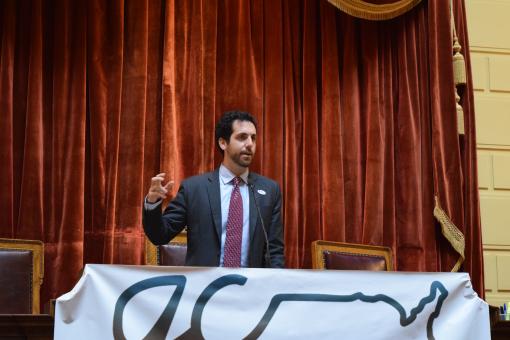When is Enough Actually Enough?
A Michelle Branch-induced breaking point.
By Scott Warren
Last May, I sat in a café on 24th and Valencia in San Francisco, gathering my thoughts after a fruitful meeting, ready to walk into a gorgeous San Francisco morning for a day full of more productivity: meetings with Board members, foundations, and an evening gala. I was ready for another productive day running Generation Citizen.
As I was about to close my laptop, I noticed an e-mail. A prestigious fellowship that I really wanted had rejected me. I stared at my screen. I was dejected. After a multi-month written and interview process, I felt like I didn’t receive the fellowship because I wasn’t good enough. I walked through the streets. My mood completely changed. The productivity felt useless.
And then, I suppressed those feelings, turned my game face on, met with Board members, foundations, smiled at the gala. I hid my feelings and told myself I was fine. Because that’s what I know how to do. That is what I am good at.
And then, without realizing it, I dove in. Continuing the narrative that the reason I didn’t receive the fellowship was that I was not good enough, and that I had not accomplished enough, I doubled down. In the last year, since I received that e-mail, GC’s budget has doubled. Our staff has grown from 15 to 30, with more on the way. We opened two new sites, in Texas and Oklahoma. We began an advocacy arm, and ran a campaign to lower the voting age to 16 in San Francisco. Obviously, this growth was not all on me, but I was the one on our team pushing ahead. I wrote a book proposal and got an agent. Needing something to keep me occupied with, and to convince myself that I was worth it, I became a Social Entrepreneur in Residence at my alma mater, Brown University, teaching a college class and middle school class, working with students, conducting research, and organizing a series.
This story is mine, but it is also so many of ours. For so many of us, enough is never enough. We are taught to always want more, expect more, push for more. In the social sector, because the problems never go away, neither do our efforts. It is a cycle that is almost impossible to get out of, once you are in the midst of it. GC raised more money that it ever has? Great, raise double that next year. Your program is working? Great, figure out how to scale it across the country. We become addicted to work. To productivity. But when your work is about doing good, who is actually going to step in and tell you to taper off?
There’s something that I didn’t do in the past year (or more than that, really): focus on myself, and those around me. I didn’t sleep. I didn’t pay attention to my personal life. I wasn’t present. I traveled too much. I wasn’t there for people who needed me.
This is not a new thing, and again, not endemic to me. But in the social sector space, we are essentially trained to constantly put on that game-face, telling ourselves, and each other, that everything is okay, even when it is not. Ask any social sector leader how they are doing, and the initial response is always something akin to “Great! Team is strong, program going well, we’re set to expand!” Probe one level. “It’s alright, I don’t feel like I’m managing my team well and we’re not raising enough money.” Probe two levels. “I’m just so overwhelmed. I don’t feel like I’m being a good enough husband/wife/friend/father/mother. I don’t know how to balance it all.” Probe three levels. “I’m not sure how long I can do this.”
As I’ve taught my class at Brown this semester, I’ve focused on different ways of achieving systemic social change work. What I have completely neglected is the emotional toll this work takes.
I’ve now been running GC for eight years, a long amount of time, and have been reflecting on the journey. Sometimes people tell me I don’t appreciate all we’ve accomplished. And yes, we have done a ton. From a college idea, we now have offices in 6 states, have worked with 40,000 students, are seen as a national leader in civics education. I could give you quotes from countless teachers and students who talk about the power of GC in their lives. I am proud.
But then. Probe one level. I’m overwhelmed. I don’t feel like I’m doing enough. I feel like we should be raising more money. I feel like I’m not being good enough of a leader to my team. Probe two levels. I feel like I haven’t been a good friend. A good son. I travel too much. Probe three levels. I’m not sure how much longer I can do this.
This is not to say that every leader is in this same boat. Some have figured it out better than others. I have found that most are able to put their game-faces on, until they can’t anymore. Until there is some sort of breaking point.
Two weeks ago, I was in the Austin airport, the fourth straight Friday night I was set to fly. One of my vices in life is that I am a huge Michelle Branch fan. I have always loved her joyful pop rock-outs, frequently playing them at staff retreats, even engaging in an impromptu karaoke in a Providence bar recently with someone I barely knew. She had just released her first new album in years, and was having a release party in NYC. A good friend of mine bought me a ticket. But that morning, I realized I could not get back from Austin in time. She probably was completely unsurprised — me flaking because of work is a common occurrence.
I sat in the airport bar, whiskey in hand, laptop at the stead. It is somewhat silly to write that missing a Michelle Branch concert was the straw in convincing me that something had to change. But it is true.
I don’t know exactly what that changing entails. But there are two things that come to mind immediately.
The first is to be more grateful. Yes, this job, and life, is challenging. And then, take a step back, and there are 30 employees that come to work every day to fulfill GC’s mission, dozens of Board members across the country, hundreds of college volunteers, thousands of students. I could not have imagined the work would grow to this level. On a personal level, so many people support and love me, in ways I don’t see until that breaking point sets in. I am very grateful.
The second is harder. And I’m not exactly sure what it is. Some of it is the smaller things — being there for people, not working all of the time, not traveling all of the time. I write all of that, and I believe it. But then I wonder if it’s possible for me to detangle all of that from work. If my identity is too tied up in that of leading this organization.
I am writing this publicly because I hope to stimulate a more honest conversation on the emotional tolls this work can take. And because, I guess I’m asking for public accountability. But I realize that I really don’t have any answers. I guess that’s the point.

Generation Citizen is a nonpartisan, 501(c)3 tax exempt organization which does not endorse candidates; our goal is to engage our staff, participants, and stakeholders in political and civic action on issues that matter to them personally and in their communities. The opinions expressed in this blog post are those of the writer alone and do not reflect the opinions of Generation Citizen.
